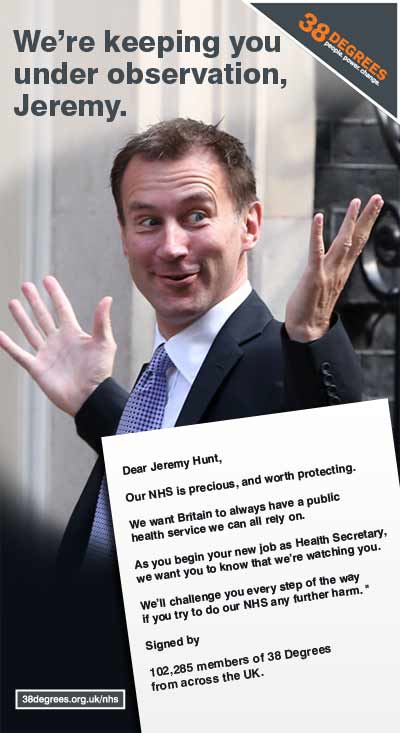NHS news review
- Conservative election poster 2010
A few recent news articles about the UK’s Conservative and Liberal-Democrat(Conservative) coalition government – the ConDem’s – brutal attack on the National Health Service.
“Low Staffing” partly to blame for child’s death
The parents of a seven-year-old boy who died following heart surgery have been told Bank Holiday staff shortages at an NHS hospital were partly to blame.
Luke Jenkins, from St Mellons in Cardiff, died in hospital on Good Friday after suffering cardiac arrest.
Luke, who was born with a congenital heart defect, had undergone successful corrective heart surgery at Bristol Children’s Hospital.
He was expected to make a full recovery, but he died within a week.
An investigation by University Hospitals Bristol NHS Foundation Trust classified the incident as ‘catastrophic’ and found a catalogue of avoidable errors contributed to Luke’s death, along with clinical patient factors.
The report identified there to be ‘low and unsafe nurse staffing’ for a cardiac high dependency unit.
…
Pro-NHS ad warns Jeremy Hunt ‘we’re watching you’
Campaign group 38 Degrees has taken out a full page ad in today’s Daily Telegraph to warn new health secretary Jeremy Hunt not to do “our NHS any further harm”.

“We do want to break up the NHS. We don’t want to privatise it, we want to break it up.” Nick Clegg.
Nick Clegg’s demand for the NHS to be broken up
…
Opponents said the comments about the NHS, in a 2005 interview in the Independent, showed that Mr Clegg had no understanding of the way the health service works.
In the interview, carried out while Charles Kennedy was leader and two years before Mr Clegg took the job, he said: ‘I think breaking up the NHS is exactly what you do need to do to make it a more responsive service.’
Asked whether he favoured a Canadian or European-style social insurance system, he said: ‘I don’t think anything should be ruled out. I do think they deserve to be looked at because frankly the faults of the British health service compared to others still leave much to be desired.
‘We will have to provide alternatives about what a different NHS looks like.’
Under a social insurance system, members pay into an insurance scheme, either themselves or through an employer, to guarantee their healthcare. It means that those who pay into a more expensive scheme can get better care.
Under the NHS, however, everyone pays into the same scheme through taxes – and is then guaranteed care that is ‘free at the point of use’.
In the interview, Mr Clegg said ‘defending the status quo’ is no longer an option. Instead, he called on his party to ‘let its hair down’, ‘break a long-standing taboo’ and be ‘reckless’ in its thinking.
‘We do want to break up the NHS,’ he said. ‘We don’t want to privatise it, we want to break it up. Should the debate be taboo? Of course not, absolutely not.’
A year earlier, Mr Clegg had contributed to the notorious Orange Book in which those on the right of the party discussed how policies should change under Mr Kennedy’s leadership. The conclusion of the book outlines in more detail the type of insurance scheme he was outlining.
‘The NHS is failing to deliver a health service that meets the needs and expectations of today’s population,’ it said.
John Lister, of the lobby group Health Emergency, said: ‘These comments show Mr Clegg does not understand the NHS. He seems to be ignorant of the fact that social insurance schemes in Europe are far more expensive.’
Shadow Health Secretary Andrew Lansley said: ‘The NHS is one of Britain’s most loved institutions. People will be worried that Nick Clegg wants to “break it up”.’ [!!! That’s Andrew Lansley pretending that the NHS is safe in Tory hands before the election !!!]
How the Orange Bookers took over the Lib Dems
…
What Britain now has is a blue-orange coalition, with the little-known Orange Book forming the core of current Lib Dem political thinking. To understand how this disreputable arrangement has come about, we need to examine the philosophy laid out in The Orange Book: Reclaiming Liberalism, edited by David Laws (now the Chief Secretary to the Treasury) and Paul Marshall. Particularly interesting are the contributions of the Lib Dems’ present leadership.
Published in 2004, the Orange Book marked the start of the slow decline of progressive values in the Lib Dems and the gradual abandonment of social market values. It also provided the ideological standpoint around which the party’s right wing was able to coalesce and begin their march to power in the Lib Dems. What is remarkable is the failure of former SDP and Labour elements to sound warning bells about the direction the party was taking. Former Labour ministers such as Shirley Williams and Tom McNally should be ashamed of their inaction.
Clegg and his Lib Dem supporters have much in common with David Cameron and his allies in their philosophical approach and with their social liberal solutions to society’s perceived ills. The Orange Book is predicated on an abiding belief in the free market’s ability to address issues such as public healthcare, pensions, environment, globalisation, social and agricultural policy, local government and prisons.
The Lib Dem leadership seems to sit very easily in the Tory-led coalition. This is an arranged marriage between partners of a similar background and belief. Even the Tory-Whig coalition of early 1780s, although its members were from the same class, at least had fundamental political differences. Now we see a Government made up of a single elite that has previously manifested itself as two separate political parties and which is divided more by subtle shades of opinion than any profound ideological difference.
…
